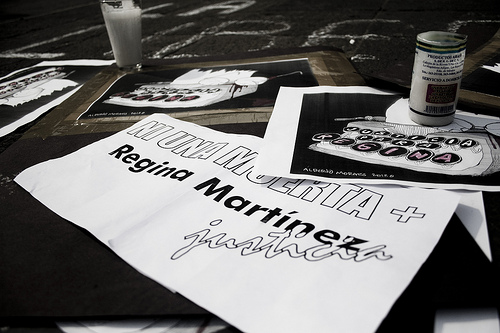[All links lead to sites in Spanish, unless otherwise stated.]
The body of journalist and correspondent Regina Martínez, from the weekly investigative news magazine Proceso, was found in her home in Xalapa, Veracruz, Mexico, on April 28. According to an initial statement released by the local government, her body showed signs of heavy blows to the face and body, with the apparent cause of death being asphyxiation by strangulation.
Later the Governor of Veracruz issued a statement including instructions to the Attorney General's Office and offering his condolences to the Martínez family:
Desde que tuvo conocimiento de este penoso suceso, el Gobernador del estado ha estado en contacto permanente con el procurador General de Justicia, Felipe Amadeo Flores Espinosa, a quien instruyó integrar un grupo especial de investigadores para aclarar la muerte de la periodista.
El mandatario veracruzano expresó sus condolencias a la familia de la comunicadora, a quienes dará todo el apoyo y respaldo que requieran en este momento tan difícil por el que atraviesan.
The Governor of Veracruz expressed his condolences to the journalist's family, who will have the government's full support through this difficult period.
The violence that has claimed the life of the journalist has been at the root of numerous reactions of condemnation and protest from the journalists’ union and the general public.
Katya Albiter from Vivir México said the following regarding Regina Martínez's death:
Una muesca más en la vergonzosa pared de periodistas caídos. Una voz más que se calla con violencia. Más reclamo, más repudio, más indignación, más rabia, más impotencia. Porque los queremos vivos, ¡vivos, carajo! Porque informar no debe ser una condena de muerte. Porque dar la vida es dar mucho, muchísimo, ante un país que no mejora y pronto olvida.
The text in which the journalist Lydia Cacho described her late colleague was posted on the blog Mujeres por la Democracia:
Regina Martínez era más bien tímida, siempre cargaba su grabadora, una libreta con pluma negra y de vez en vez se acomodaba los lentes como un tic cuando estaba muy concentrada en entrevista. Durante años fue corresponsal de La Jornada en Veracruz y como todas las reporteras y reporteros del País trabajaba también para medios locales para poder subsistir. La última década, hasta antier, fue corresponsal de la Revista Proceso. Hasta antier que apareció asesinada en su casa, severamente golpeada. No quiero imaginarme cómo murió, espero que podamos averiguarlo para conocer a los culpables. Regina no hubiera imaginado nada, hubiese buscado la evidencia, las pistas, perseguido a todas las fuentes para contrastar la información. Con discreción y ética hubiese trabajado hasta hallar las piezas del rompecabezas que llevan a la verdad. Así debemos hacerlo sus compañeras, sus compañeros indignados frente a este asesinato.
Desde Abajo, meanwhile, posted a comment from Soledad Jarquin, in which she suggests that the journalist's murder threatens freedom of speech, while also linking it to the war [en] against organised crime that has been taken up by the administration:
El pasado fin de semana volvió a pasar lo que no queremos que pase en este país ni en ninguna otra parte del mundo. El asesinato de la periodista Regina Martínez, corresponsal de la revista Proceso en la ciudad de Xalapa, Veracruz, es otro intento por amordazar la libertad de expresión y por callar la verdad que trastoca casi siempre intereses económicos y políticos relacionados o no con la delincuencia.
En un estado de guerra como el que vivimos en México, ejercer la profesión del periodismo se ha convertido en una de las actividades más peligrosas y el asesinato de Regina Martínez nos ha vuelto a recordar ese terreno nada seguro sobre el que se está parado y nos recuerda también lo que se advirtió desde hace casi cinco años cuando Felipe Calderón decidió iniciar una guerra que se advertía peligrosa para la ciudadanía y en especial para aquellas y aquellos periodistas que investigan y descubren verdades incómodas para los grupos o mafias en el poder.
A state of war like the one in which we live in Mexico makes journalism one of the most dangerous professions, and the murder of Regina Martínez has once again reminded us all that even those things that are standing are not certain. It is also a reminder of the warning from almost five years ago when Felipe Calderón decided to wage a war that was dangerous for the people, and especially dangerous for those journalists who investigate and discover uncomfortable truths about the groups or mafias in power.
On Twitter, Jenaro Villamil (@jenarovillamil) condemned the killing and took advantage of the opportunity to refer to Roger Waters’ concert in Mexico City:
#ReginaMartínez. No a los cerdos asesinos, como canto Roger Waters ayer. Derrumbemos El Muro. http://yfrog.com/hsh2auej
Regina Martínez's fellow journalist Álvaro Delgado (@alvaro_delgado) expressed the demands of his publishing house to the authorities:
Los miembros de la @revistaproceso exigimos a @FelipeCalderon y a @Javier_Duarte que el brutal crimen de #ReginaMartinez no quede impune.
Criminal lawyer Ulrich Richter (@UlrichRichterM) showed his support for this demand:
@alvaro_delgado @revistaproceso @felipecalderon @javier_duarte y también los ciudadanos exigimos No mas asesinatos a periodistas.
Meanwhile Darío Ramírez (@expresate33) provided statistical data on deaths of jounalists during the current presidential term:
El promedio de asesinatos de periodistas en México desde el 2006 es de 9 al año. En ningún país “en paz” existe algo semejante.
There is a consensus in the condemnation of the murder of journalist Regina Martínez, and the community is looking to the authorities not only in search of answers but also results, which will prevent journalistic voices being silenced in a violent and definitive way, thus damaging freedom of speech, the right to inform, the right to investigate and the individual's right to receive information.








1 comment